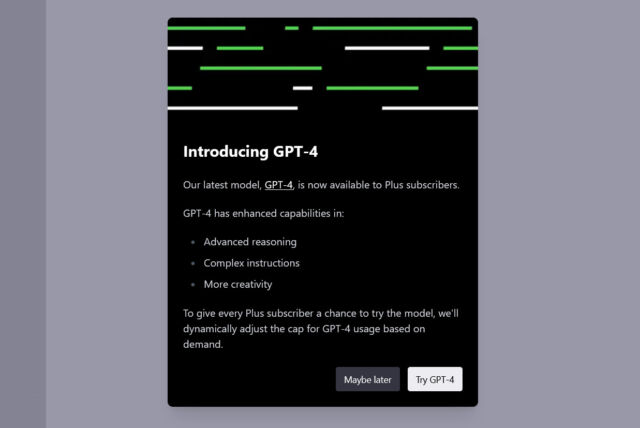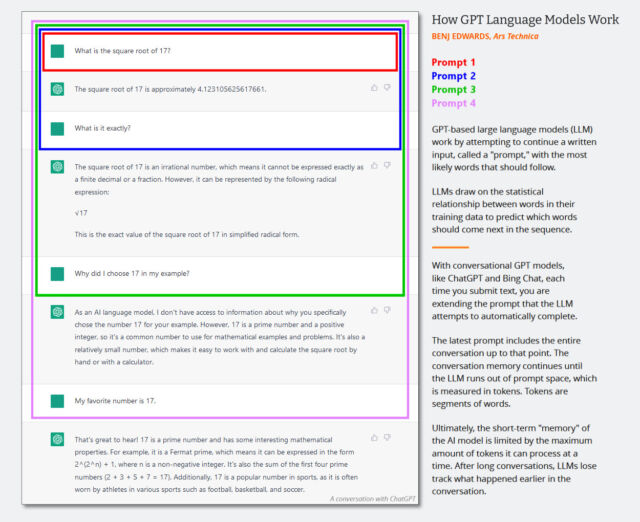
One year ago today, on November 30, 2022, OpenAI released ChatGPT. It's uncommon for a single product to create as much impact on the tech industry as ChatGPT has in just one year.
Imagine a computer that can talk to you. Nothing new, right? Those have been around since the 1960s. But ChatGPT, the application that first brought large language models (LLMs) to a wide audience, felt different. It could compose poetry, seemingly understand the context of your questions and your conversation, and help you solve problems. Within a few months, it became the fastest-growing consumer application of all time. And it created a frenzy in the tech world.
During these 365 days, ChatGPT has broadened the public perception of AI, captured imaginations, attracted critics, and stoked existential angst. It emboldened and reoriented Microsoft, made Google dance, spurred fears of AGI taking over the world, captivated world leaders, prompted attempts at government regulation, helped add words to dictionaries, inspired conferences and copycats, led to a crisis for educators, hyper-charged automated defamation, embarrassed lawyers by hallucinating, prompted lawsuits over training data, and much more.
For some, ChatGPT has also proven itself a useful tool, accelerating programming tasks for certain software developers, assisting writers with compositional and editing chores, and providing quick, ad-free and cookie-banner-free advice on topics at a time when some social media sites have fractured and our previous oracle of sometimes-iffy Internet knowledge, Google, has fallen into terrible disrepair.
"Imagine if every human being could automate the tedious, repetitive information tasks in their lives, without needing to first get a computer science degree," AI researcher Simon Willison told Ars in an interview about ChatGPT's impact. "I'm seeing glimpses that LLMs might help make a huge step in that direction."
From tech demo to tech titan
Even with all the impact, none of this was planned ahead of ChatGPT's launch. In fact, it started out as a tech demo. According to an excellent feature on the creation of ChatGPT from MIT Technology Review published in March—which might as well be 3,000 years ago—OpenAI viewed it as a research preview, a way to collect feedback on its flaws by opening it up to the public. "We didn’t want to oversell it as a big fundamental advance," OpenAI scientist Liam Fedus told that publication.

ChatGPT is based on technology that attempts to predict the most likely next token, or fragment of a word, in a sequence. Sometime in 2019, after the release of GPT-2, someone realized that this technology could be turned into a chatbot if the large language model were fed the transcript of a conversation that it had to complete. Using this method, each prompt to the language model includes the entire history of the conversation. In the GPT-3 era, OpenAI included an implementation of this chat-like feature in the developer testing area (called "Playground") on its website, but it was not public-facing. With ChatGPT, OpenAI took that concept, streamlined it by fine-tuning a version of GPT-3 on chat transcripts, and released it for the public to play with.
From a tech point of view, ChatGPT didn't initially strike many as being especially novel, among those paying attention to AI. Chatbots had existed for some time. GPT-3, the AI model that led to ChatGPT, had been out since 2020. In September 2022, a compelling AI chat site called Character.ai launched, and we used it to interview "Linux." And just two weeks before ChatGPT, Meta had been publicly shamed for launching a public preview of Galactica, an AI model that purported to write science literature but could also hallucinate racist nonsense.

But compared to Galactica, OpenAI approached things from a different angle with ChatGPT. From the start, the company took a modest and cautious approach that allowed the experiment to continue even in the face of rigorous public testing. Out of the box, ChatGPT refused to answer some inflammatory questions, and as wily users looking for social media points worked around each limitation, OpenAI erected new guard rails to keep ChatGPT in line. Those limitations frustrated many, who hated the artificial hand-holding, but they prevented media flare-ups that may have otherwise killed the project.
OpenAI CEO Sam Altman was also open about ChatGPT's limitations. Soon after launch, he tweeted, "ChatGPT is incredibly limited, but good enough at some things to create a misleading impression of greatness. It's a mistake to be relying on it for anything important right now. It’s a preview of progress; we have lots of work to do on robustness and truthfulness." Later, he wrote, "It does know a lot, but the danger is that it is confident and wrong a significant fraction of the time."
But ChatGPT never stood still. OpenAI frequently tested out new features on the huge audience, who often used it for free, although a paid tier for priority access (ChatGPT Plus) was added in February. With the launch of GPT-4 in March 2023, ChatGPT received a dramatic upgrade, reducing confabulations and becoming a more reliable assistant. Since then, OpenAI has added speech conversations, image generation, and image interpretation to ChatGPT. To this day, ChatGPT's GPT-4 is still widely considered the front-runner among AI language models, even as giants like Google race to catch up with PalM and Gemini.
reader comments
140